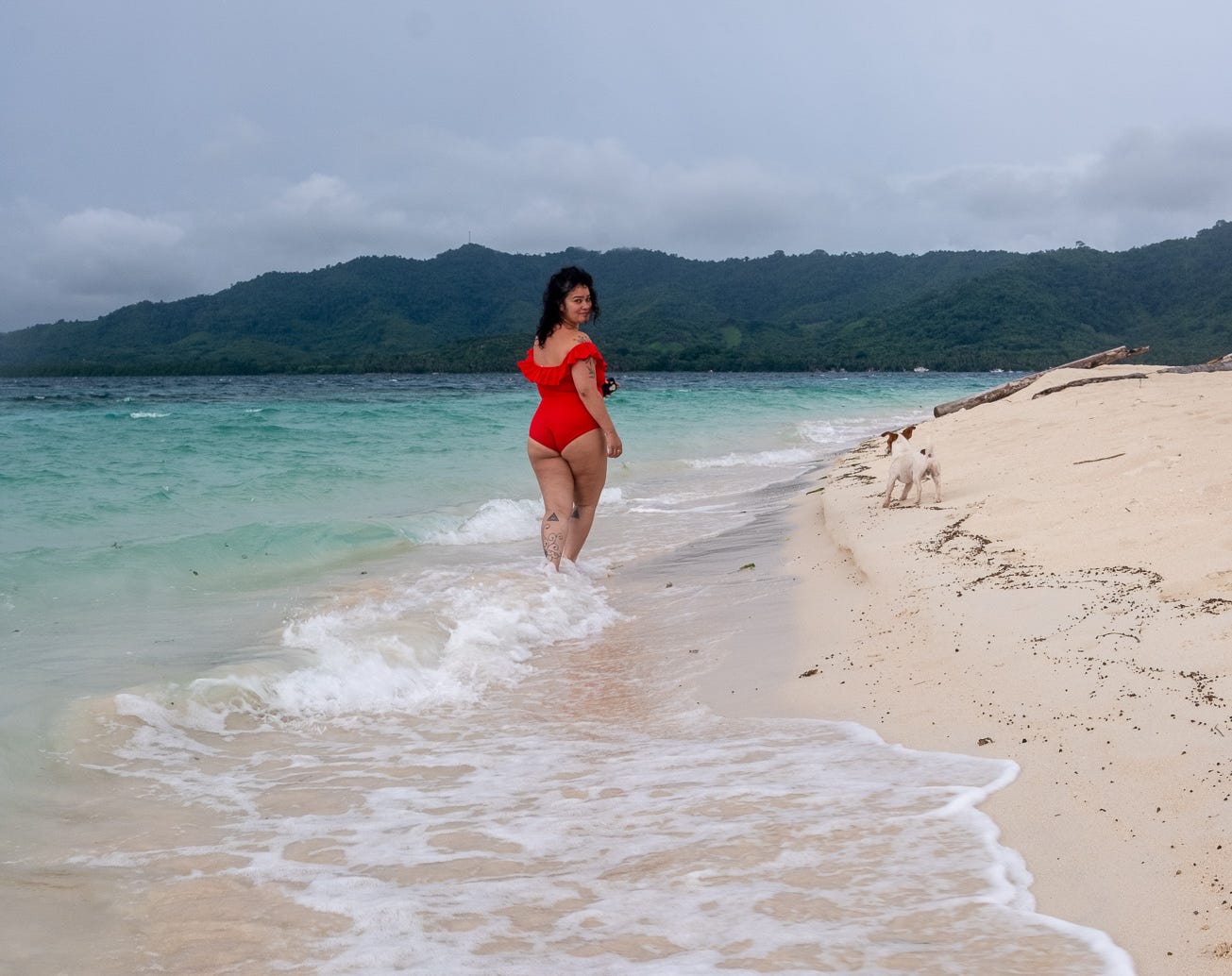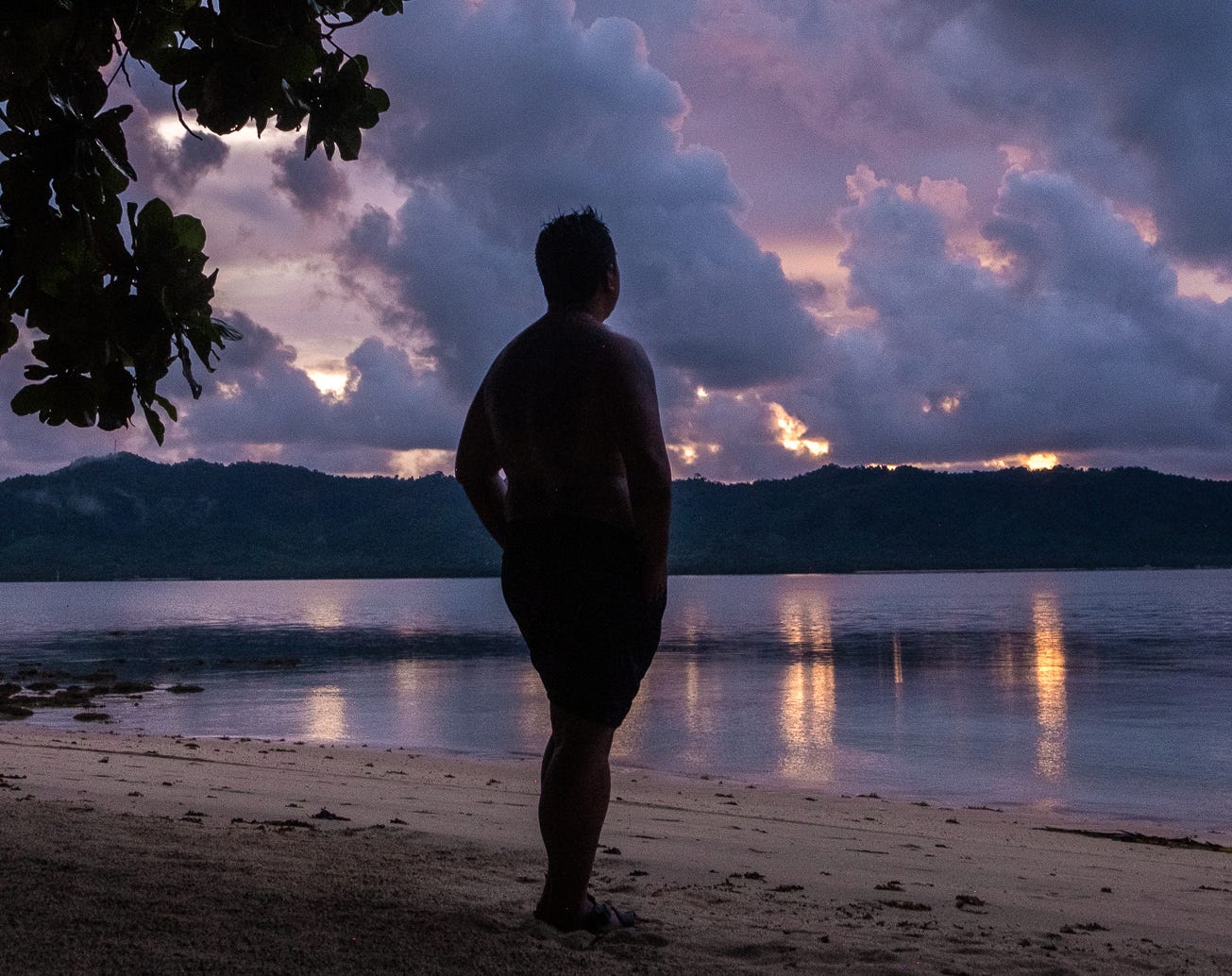No. 25 | Monsoon honeymoon
Coming home to the Philippines after nearly three years, and what I found there
Exchanging Amsterdam for Manila in the dead of winter—when I’m depressed, demotivated, and fed up with the cold and dark—is easy. Tearing myself away from Amsterdam at the height of summer is another story.
As the taxi sped towards Schiphol Airport, gliding past freckled arms and smiling faces, puppies and picnics on boats, streets full of life and canals shining with the promise of a glorious summer, I felt a pang that was almost physical in its intensity.
Why do I have to leave home to go home? Such is the paradox of an immigrant’s life.
It was my first time to fly to the Philippines for summer holidays instead of Christmas. It was also my first time to return to Manila and see my family since December 2019. I was filled with excitement, but also a dread I didn’t understand nor wanted to feel.
The pandemic was hard on Filipinos, who suffered the world’s longest lockdown and only face-shield mandate, under an inept, criminally corrupt government. My friends with kids have been home-schooling them for two and a half years. Everyone still goes out with masks on. There, the pandemic we are healing from—and want to forget—is far from over.
Living in Amsterdam insulated me from the worst of the last two years. My daughter went to school for all but three months; I rode my bike anywhere and everywhere; despite a drastic shrinkage of my social circle, I enjoyed the company of my friends, and even (the biggest surprise of all) acquired a boyfriend in the sixth year of my open marriage.
I knew this homecoming would burst my bubble. I braced myself for the impact of the pandemic on my family back home. My sister tried to warn me: Mom’s not the same. It would be, I thought, a long-delayed reckoning.
Landing in Manila, I was overwhelmed by everything: the grime and gridlock; the intense blue of the sky, tinged with magenta because of the pollution; how everything was falling apart in the relentless humidity; how my sister sounded exactly like me when she laughed.
I tried to fill my senses in delicate nibbles, but instead I gorged on all that I had missed.
I ate mangoes for breakfast every single day. I guzzled coffee from the Sagada highlands with a fatty swirl of fresh milk from young coconut meat that had been grated and squeezed by hand at the market that same morning. I couldn’t get enough buttery-sugary-cheesy mouthfuls of fluffy ensaymada, or chewy tapioca pearls at the bottom of a cold Hokkaido milk tea.
I taught my daughter how to pull out the thread-like stamens from the bright coral santan flowers that grew by the pool; to touch her tongue to the single sweet dewdrop at its delicate tip; then to thread them into chains for our wrists and necks, just like I did when I was a little girl. I taught her the names of things in our native tongue—tutubi (dragonfly), langgam (ant), atis (custard apple)—wondering how much she would remember.
I wanted to give her everything she didn’t know she missed, that I missed too.
Eleven years of Amsterdam life have been, in a way, a de-armoring. Certainly, the comforts of a developed country have softened me. Also, the process of writing a memoir has been an exercise in vulnerability, peeling away one layer after another, leaving me raw and exposed. The more I feel, the better I write.
Returning to a life that I had left behind, everything hit hard and fast: ups and downs, hardship and delight, longings and frustrations, hardship and hopes, with little downtime or solitude to process.
Yet I found answers to questions that writing my memoir had unraveled.
I began to understand how growing up in Manila shaped me. Why I’m so used to complexity, and crave it in my life. Why my nervous system is steeped in cortisol. Why—as my mom friends wondered—I have so much energy for partying and dating. (Answer: because I’m no longer trying to just survive every day. That, and not sitting in Manila traffic for four hours a day, frees up a LOT of energy).
I began to understand that back home, the harshness of daily life makes every delight, as small as it is, all the sweeter. Every bite of luscious ripe mango and sip of coconut-creamed coffee, a pleasure. Every hug from a friend, a comfort and privilege. Every new adventure with my sister and every deep-dimpled laugh from my mother, a joy.
Being home, I oscillated between a kind of low-level PTSD and sweet reminiscence.
Seeing all manner of public transport jammed together on Ortigas called up sharp smells and textures. The particular odor of an airconditioned bus in the Philippines, a wet musty exhale in the tropical heat; the crunchy plastic of the ripped seats; the unwelcome weight of a stranger’s sweaty head nodding onto your shoulder; the sense of being trapped.
Yet the flash of a single firefly in the trees outside our Airbnb in Calamba brought me back to a younger Deepa and Marlon, skinny and broke, gliding down a silent river on a motorless banca in the pitch dark, clouds of fireflies in the mangrove trees like gathered starlight.
How easily we forget the magic we share.
Marlon and I planned a four-day getaway to El Nido, Palawan—a UNESCO-protected marine reserve—during the second week of our trip. Just us, kid-free, leaving the mini with my mom and sister for the first time in four years. We hadn’t had so much time alone together in so long.
Parental guilt almost made us take her with us at the last minute. Didn’t we also want her to see the Philippines outside the gated subdivisions and shopping malls? Didn’t we want her to understand how beautiful and special our country is?
“Ano ba?! Take the honeymoon na!!!” my sister texted me.
“Tala will have one-on-one time with family while you’re gone,” my best friend reassured me. “This is also a special experience.”
I was wracked with guilt over our tearful goodbye, but as soon as we arrived at the Tao Beach Farm in El Nido, we knew we’d made the right decision. Marlon and I were the only guests, because the windy, stormy habagat (southwest monsoon) is the off season for domestic travel. There was only Dhong, who was kind of like our own island butler, our cooks Dok and Vincent, and our mascots, Digong the Rottweiler, and Ago, an inquisitive puppy of indeterminate breed.
In the mornings, Marlon took a paddle board out onto the glassy bay, while I climbed a bamboo pagoda to scribble in my notebook among the swaying tops of coconut trees. We lazed in the shade and swam in the sunshine. Occasionally a lone banca would cross the bay, its slender grace incongruous with its diesel racket.
Every afernoon, a smiling Vincent would turn up like magic, just before it rained, with a tray of freshly brewed barako coffee and banana fritters, crispy and sweet. God, there’s nothing like hot barako and just-fried turon in the pouring tropical rain.
The power came on for four hours every evening. Before the lights went off, we bathed outdoors, a giant elephant’s ear leaf as our shower curtain. At night we slept under a mosquito net, the pervasive, endless damp of habagat clinging to our bodies like a second skin.
My life in Amsterdam, which had been so hard to leave, felt distant and unreal, a mirage with no bite or power.
The only life that mattered was here, with each other. Sharing a cigarette and a cold bottle of San Mig Light. Watching the hermit crabs emerge from their holes and scuttle across the sand. Laughing and shrieking as bats dropped half-eaten fruits from the giant talisay tree on our heads.
It’s easy to forget how much we’ve seen and done together. Logically, I know we’ve been together for 19 years—4 years dating long-distance, nearly 15 married, but the entirety of that experience is never fully present at a lesing given time.
It can feel so good, after 19 years, to affirm something as simple as: I really like being with you. I’m so lucky to have found you. And to understand that our dreams spring from the same roots, take the same shape, and ultimately, will grow in the same soil.
To become present to our shared history, and to refill our tank with the incandescent rocket fuel of dreams, was the gift of being home again.
I could write so much more. About submerged shipwrecks and deep sea magic. About dancing clouds and shooting stars. About coming home to the hugs and kisses of our sweet girl. About what it felt like to hold space for my mother as she struggles with aging, and why I cried when my father-in-law prayed over us.
Then suddenly it was over. Three weeks, just like that. All we had left was our sun-browned skin, a suitcase full of coffee and pearls (not to mention the most ridiculous giant straw hat), gigabytes of memories, airport goodbyes and promises to return.
And once more, I had to tear myself away from home to come home again.
Hello September, I’m back. I know, I know. I rolled up all the letters I should have written you—with all the impressions and feelings I should have poured out onto the page, instead of piling up in my head—into one long one. Thanks for your patience, and thanks for reading.
Did you have a homecoming this summer, too? Or did you set off on a new adventure? Tell me. You know I love hearing from you, so hit that reply button.
Here in Amsterdam, it’s light jacket weather. Autumn whispers in the soft blue skies and crisp cool air of the mornings, bringing with it the promise of change. After living in the Netherlands for 11 years, I’ve just received my Dutch passport, and I’m taking it on a new adventure with me tomorrow.
See you in two weeks!





Deepa, I love your writing so much. Not only did you transport me away from my desk to your beautiful Philippines, but you also made my throat choke with emotion reading your honest words about the cost of the pandemic, family, long-term relationships, belonging and homecoming. I've lived abroad for ten years and the going 'home' then returning 'home' again is always full of deep emotions, a constant mixing of past and present, of having and not having, arriving and leaving. I got so much from this piece of writing, thank you x